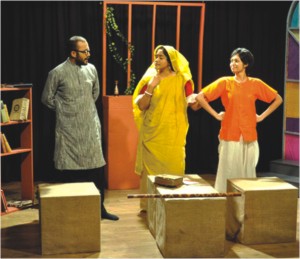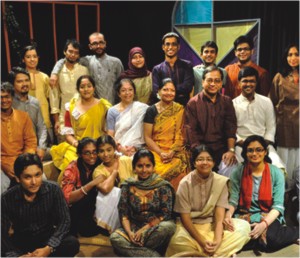|
Centre Stage
Some good laughs with Tagore
Saad Adnan Khan
 |
The play 'Testing the student'. Courtesy: Rubaid Iftekhar Mahbub |
Whenever we think of Rabindranath Tagore, we usually end up thinking about the human complexities (or simplicities), anti-colonial resistance and sentiments he explored through his writings. What often eludes our attention is that Tagore also wrote great pieces of comedy and satire. On July 1, 2011, in a theatre studio called Shadhona, some passionate members of Brine Pickles, a performance literature group that includes students and teachers from public and private universities, came together to celebrate some of Tagore's comedies with much exuberance.
The hour long show included songs, plays and a dramatic poem recitation. The occasion did not only highlight the wits and humour of Tagore's writings, but also celebrated the publication of the book “The Essential Tagore”, co-edited by Dr Fakrul Alam, one of the distinguished teachers and translators of Bangladesh. The book is a comprehensive collection of translated works of Tagore's writings and letters by acclaimed Indian and Bangladeshi translators and international diaspora writers. The book was published jointly by Harvard University Press and Visva Bharati Press. The three plays that were performed in English were taken from this book.
Veteran dancer Lubna Marium, the owner of Shadhona studio- a center for advancement of South Asian culture, identifies the studio as a “pocket theatre”, given the small size of the theatre hall. The studio room fit in about thirty audiences. There wasn't any raised platform for the performers and there were cushions, jute mats or simply the floor for the audience to sit on. Overall, the room had a cozy and homely ambience.
The show started off with singers singing “hai hai hai, din choley jay” on guitar and harmonium tunes. To set up a sense of coherence between the song and the act, one of the actors was sitting behind the singers, silently playing his role on the background for the next skit. The play was called “Aryans and Non-Aryans” that addresses the exclusivity and snobbery of Aryans during Tagore's time. The next two plays were “Testing the student” and “The funeral”, which address cruelty of corporeal punishment and greed for property. All the three plays were social satires that Tagore wrote using a lot of humour.
 |
Members of Brine Pickles with Lubna Marium and Fakrul Alam. Courtesy: Rubaid Iftekhar Mahbub |
The lighting of the show, which ranged from dim lights to bright spot lights to soft hued pink and orange lights, was thoughtfully planned. The use of such lighting gave the dramatic touches the characters and plays needed to accentuate the different settings and mood. The characters came under crispy spot light when they gave monologues. The small scale set included long black curtains on the background and some ordinary furniture that made the settings seem real.
The performers were commendable at what they did. Their exaggerated body language, mix of both English and Bengali dialogue, use of theatrical elements like dramatic monologues, made the audience break into laughter and brought the plays to life and colour. “Since we were dealing with comedy, there was a lot of action involved and very few dialogues. That was difficult and at the same time very interesting to act out”, says Sameeha Suraiya, one of the actors. The anchor of the show also requested the audience to donate money for Sohel Rana, an English Literature major from Dhaka University who is suffering from kidney failure.
“I think it was very innovative and experimental. The actors improvised a lot which was interesting”, says Dr Fakrul Alam about the show. He believes that Tagore should be accessible to everyone. “People usually think of Tagore as a serious poet. The essential Tagore has tried to capture the infinite varieties of Tagore's works, which includes his comedies as well”, explains Dr Fakrul Alam. The fact that these actors did such a remarkable job in presenting the plays with such zest proves that Tagore can be brought to life very easily and that he is still alive among us after all these years.

In 1947, Guevara started medical school at the University of Buenos Aires. There he developed a great love for chess and for rugby, which he played well despite the fact that he had asthma. It was also at school that he probably started discovering Socialism and the Marxist theory (and where he began developing a deep hatred towards the United States!). He also started liking traveling and hitchhiking and in 1950 he traveled in a motorbike through most of Argentina's backward Northern provinces.
Information source: Internet.
|
